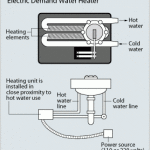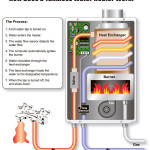Tankless hot water heaters, an increasingly popular option for residential luxury living in Boston. Hot water on demand with little need for storage space. Here we discuss what are tankless hot water heaters? How do they work? and What are the advantages and disadvantages of tankless hot water heaters?
What is a tankless hot water heater?
 Tankless water heaters heat water directly without the use of a storage tank. When a hot water tap is turned on, cold water travels through a pipe into the unit. Either a gas burner or an electric element heats the water. As a result, tankless water heaters deliver a constant supply of hot water. You don’t need to wait for a storage tank to fill up with enough hot water. However, a tankless water heater’s output limits the water flow rate.
Tankless water heaters heat water directly without the use of a storage tank. When a hot water tap is turned on, cold water travels through a pipe into the unit. Either a gas burner or an electric element heats the water. As a result, tankless water heaters deliver a constant supply of hot water. You don’t need to wait for a storage tank to fill up with enough hot water. However, a tankless water heater’s output limits the water flow rate.
What are the advantages and disadvantages of a tankless water heater?
Advantages of tankless water heaters
- ENERGY STAR® estimates that a typical family can save $100 or more per year with an ENERGY STAR qualified tankless water heater. In some scenarios, a residence installing a demand water heater at each hot water outlet can see a reduction in water heating costs by as much as 50%.
- This compact design saves space
- Homeowners are far less likely to experience leaks or ruptures
- Maintains efficiency throughout its service life
- Less prone to hard water, sediment, or mineral problems
- Tankless water heaters will usually last longer and have lower operating and energy costs, which could offset its higher purchase price.
- Most tankless water heaters have a life expectancy of more than 20 years. In contrast, storage water heaters last 10–15 years.
 Tankless hot water heaters provide hot water at a rate of 2–5 gallons (7.6–15.2 liters) per minute. Gas-fired tankless water heaters produce higher flow rates than electric ones. Sometimes, however, even the largest, gas-fired model cannot supply enough hot water for simultaneous, multiple uses in large households. Taking a shower and running the dishwasher at the same time can stretch a tankless water heater to its limit. To overcome this problem, installing two or more tankless water heaters, connected in parallel for the simultaneous demands of hot water. You can also install separate tankless water heaters for appliances — such as a clothes washer or dishwasher — that use a lot of hot water in your home.
Tankless hot water heaters provide hot water at a rate of 2–5 gallons (7.6–15.2 liters) per minute. Gas-fired tankless water heaters produce higher flow rates than electric ones. Sometimes, however, even the largest, gas-fired model cannot supply enough hot water for simultaneous, multiple uses in large households. Taking a shower and running the dishwasher at the same time can stretch a tankless water heater to its limit. To overcome this problem, installing two or more tankless water heaters, connected in parallel for the simultaneous demands of hot water. You can also install separate tankless water heaters for appliances — such as a clothes washer or dishwasher — that use a lot of hot water in your home.
Disadvantages of Tankless Hot Water Heaters
- The initial cost of a tankless water heater is greater than that of a conventional storage water heater,
- A single tankless hot water heater cannot provide enough hot water for simultaneous, multiple uses in large households.
- In certain models, the pilot light can consume more energy than other models. Be sure to ask how much energy is used by the pilot light on the model you are considering.
Find a Tankless Water Heater Professional in the Boston area by Contacting Connaughton Construction today! or Call 781-899-1438, ext. 14 for John.
Related articles
Is a tankless water heater right for your home?
Rheem Tankless Water Heater is listed as one of the top 7 on the market.
About the Author. “Lover of all things digital – writing, SEO, websites – Carol Scalzo is the founder of Hit-the-Web Marketing where she helps businesses create significant, consistent, and valuable pieces of content. You can see more of her work at The Retail Factor, follow her on Twitter, or join her email list for businesses who want to turn their websites into lead generating machines.”


